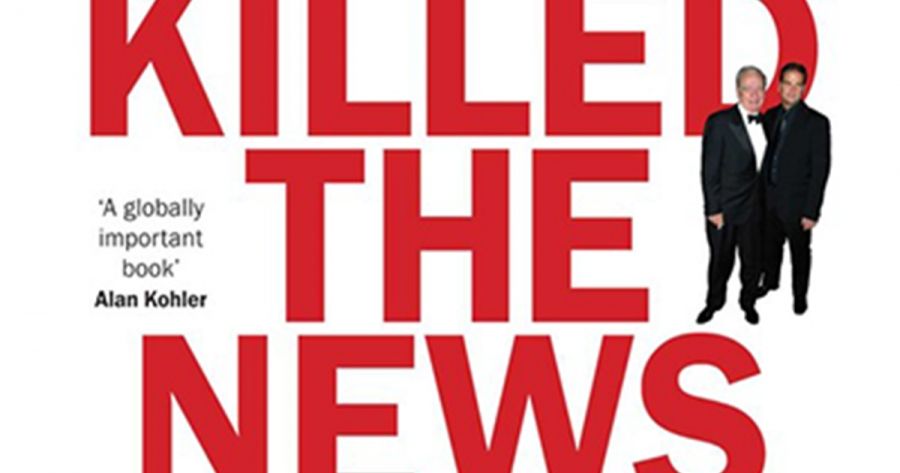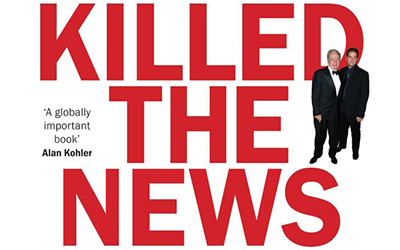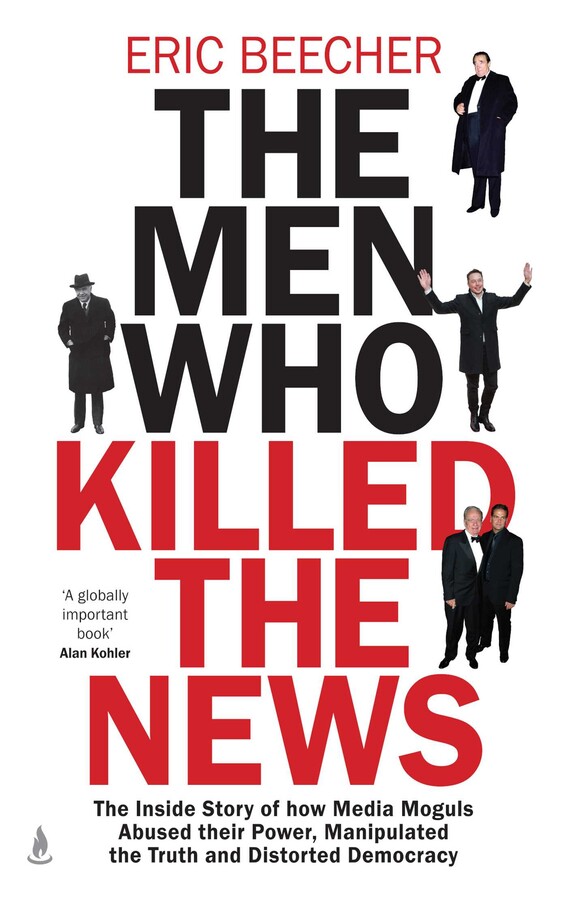
- Free Article: No
- Contents Category: Media
- Review Article: Yes
- Article Title: Quicksand
- Article Subtitle: Notes from a media outsider and insider
- Online Only: No
- Custom Highlight Text:
Media owners and enablers, autocrats and charlatans, henchmen and underlings, midshipmen and first mates, hangers-on and frenemies populate this book. The Men Who Killed the News is about media moguls over the past 150 years, with the occasional grand-mogul and even anti-media mogul (see Silvio Berlusconi) thrown in.
- Featured Image (400px * 250px):

- Alt Tag (Featured Image): Bridget Griffen-Foley reviews ‘The Men Who Killed the News: The inside story of how media moguls abused their power, manipulated the truth and distorted democracy’ by Eric Beecher
- Book 1 Title: The Men Who Killed the News
- Book 1 Subtitle: The inside story of how media moguls abused their power, manipulated the truth and distorted democracy
- Book 1 Biblio: by Eric Beecher Scribner, $36.99 pb, 411 pp
- Book 1 Cover Small (400 x 600):

- Book 1 Cover (800 x 1200):

This, then, is a book of both insider and observer, and a work of distillation, commentary, and some memoir, rather than of original research. While contemplating Rupert Murdoch’s offer to run the Melbourne Herald, Beecher tells us disarmingly, he re-read every Murdoch biography then published and rated his odds of surviving News Corp at fifty-fifty. He has continued to plough his way through tomes about Murdoch’s public and private life (‘a micro-publishing industry’ in itself), along with biographies of Hearst, Northcliffe, Pulitzer, Beaverbook, Musk, Zuckerberg, and other proprietors.
In dissecting ‘media owners as a species’, Beecher critiques the conflicts between profit and conscience, and the role of the media and the behaviour of its owners. He takes us through the development and exploitation of a ‘magic formula’ that has been in place since the late nineteenth century: ‘titillating journalism = mass audiences = abundant advertising revenue = vast profits = political power’.
After a few years at the Herald & Weekly Times and News Corp, Beecher elected to eject himself. He was no longer prepared to jump ethical hurdles: to sack a journalist because Murdoch didn’t like his politics; downplay stories which went against commercial interests; or support a favoured political party. In resolving to get out before ‘ego became the quicksand that sucked me into a morally compromised place’, he left without a payout, because he also refused to sign a non-disclosure agreement. Thus Beecher is free to write this book, in which NDAs are just one component of the media moguls’ playbook. (There is a passing reference to ‘diary notes’ about the ‘propaganda sausage factory’ at the Herald during the 1987 federal election – what a compelling read those diaries would be.)
The A- and B-list dramatis personae in the preliminary pages to The Men Who Killed the News occupy a rich tableau. Beecher has an eye for a good scene, whether from the accounts of other authors (such as of an obeisant Prime Minister Joe Lyons, holding his hat, being shouted at in Keith Murdoch’s office in the 1930s) or from his own experience in newsrooms and boardrooms. The book begins with the open letter Beecher and Peter Fray, the editor-in-chief of Crikey, wrote to Lachlan Murdoch in 2022 inviting him to sue for defamation after a piece about the sorry state of US politics. (Sir Keith’s grandson took the bait, but later dropped the case.)
The Men Who Killed the News is divided into four sections: ‘Moguldom’, ‘Power’, ‘Malfeasance’, and ‘The Future’. While the first three of these rather merge into each other, Beecher uses rich men behaving badly to focus on the uses and misuses of power, ethically constrained media organisations, and amoral and immoral journalism. The sensational Hitler diaries debacle of 1983, and the propaganda operations of Fox News, are given their own pithy chapters. The book is largely about Britain, the United States, and Australia, with some discussion of France and Italy, and also of Russia and India. ‘The idea of journalism that is independent of government,’ notes the author, ‘is a peculiarly Western democratic concept’.
After a career in journalism, Beecher knows how to engage and draw in the reader. Vivid characters, analogies, and anecdotes (more than one of which he admits may be apocryphal) of follies and foibles are backed up by fifty pages of endnotes. ‘The news media today is like a once-prosperous man about town who now tramps the same streets, shabbily dressed, looking for handouts,’ Beecher observes towards the end of the book.
In a chapter on ‘The Moral Compass’, and in his fairly brief final section, Beecher considers some media owners and outlets – including Time magazine, the Washington Post, the Guardian, the Economist, Le Monde, Rappler, and The Sydney Morning Herald – which have had serious intent, ‘moral purpose’, or egalitarian instincts in varying degrees. He writes about the success of The New York Times and its subscriber base, and considers the ‘deeply controversial proposition’ of government subsidies helping to bankroll civic journalism.
Just as he has lived and worked through the decline of the analogue media world and the rise of the digital, Beecher has, in the past few years, seen technology start to replace humans. In a couple of pages of dot points, he summarises the alarming dangers posed by Artificial Intelligence to existing models of journalism – including professional and trustworthy journalism, and civic, political, and democratic norms. Conceding that the ‘Mogul Era’ has almost ended, with profits largely spent or banked, Beecher contends that media power wielded by humans matters more, not less, in the age of algorithms.
The Men Who Killed the News is a passionate and excoriating book that should inform and disturb the general reader interested in media, power, and misinformation.


Comments powered by CComment